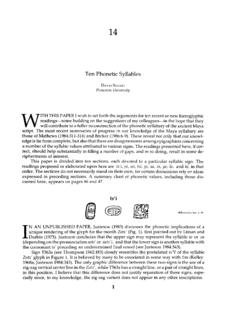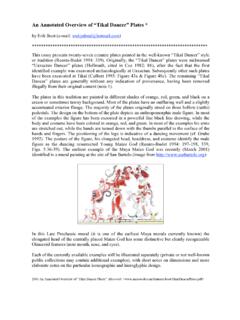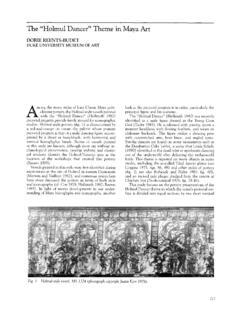Transcription of POPOL VUH - Mesoweb
1 Mesoweb Publications POPOL VUH sacred Book of the Quich Maya People Translation and Commentary by Allen J. Christenson 2007 POPOL Vuh: sacred Book of the Quich Maya People. Electronic version of POPOL Vuh: The sacred Book of the Maya (University of Oklahoma Press, Norman, 2003). Mesoweb : 2 To my wife, Janet Xa at nu saqil, at nu k'aslemal Chib'e q'ij saq ACKNOWLEDGEMENTS This volume is the culmination of nearly twenty-five years of collaboration with friends and colleagues who have been more than generous with their time, expertise, encouragement, and at times, sympathy. It has become a somewhat clich d and expected thing to claim that a work would not be possible without such support. It is nonetheless true, at least from my experience, and I am indebted to all those who helped move the process along.
2 First and foremost, I would like to express my sincerest gratitude to my Maya teachers, colleagues, and friends who have selflessly devoted their time and knowledge to help carry out this project. Without their efforts, none of it would have ever gotten off the ground . I would like to particularly recognize in this regard don Vicente de Le n Abac, who, with patience and kindness, guided me through the complexity and poetry of K'iche' theology and ceremonialism. Without his wisdom, I would have missed much of the beauty of ancestral vision that is woven into the very fabric of the POPOL Vuh. I dearly miss him. I would also like to acknowledge the profound influence that Antonio Ajtujal V squez had on this work. It was his kind and gentle voice that I often heard when I struggled at times to understand the ancient words of this text. Others who have aided this work include Diego Ch vez Petzey, Nicol s Ch vez Sojuel, Felix Choy, Gregorio Chuc, Juan Mendoza, Francisco Mendoza, and Juan Z rate.
3 I am deeply indebted to Jim Mondloch for his extraordinary generosity in offering to read through the translation. His depth of knowledge with regard to K'iche' grammar, syntax, and 3 modern usage were invaluable. I purchased a copy of his Basic Quich Grammar in 1976 to help in my quest to learn the language at a time when such aids were very rare. The book was a steadfast friend and companion during the next few years. Not only was it a brilliant work but it proved to be just the size and weight to dispatch mosquitos on the wall of my adobe shack. I thus owe to him, not only much of my initial knowledge of the K'iche' language, but my red blood cell count in those days as well. I am also grateful to John Robertson for his guidance, particularly with regard to the orthography of the text. He was a patient educator to me when I began work with the K'iche' language nearly twenty-five years ago, helping to prepare a dictionary and grammar.
4 He was an ideal boss and a wise teacher. It is a great honor for me to occupy the office next door to his at the university. I am sincerely indebted to my friend and colleague Ruud van Akkeren who went to extraordinary lengths to share with me his profound understanding of highland Maya ethnohistory. I value his knowledge, experience, and generosity in reading through various versions of this volume and offering his insights. As in much of what I do that is of worth in the academic world, I acknowledge the influence of my mentor, Linda Schele. As a graduate student, Linda encouraged me to complete the translation of the POPOL Vuh at a time when I was content to throw up my hands after I had worked through the mythic sections. It was her love for the Maya people and passion for their language that reminded me why we take on overwhelming tasks such as this, and why it s worth the price in life and heart that we put into them.
5 Among the many who have contributed in invaluable ways to this project, I would like to recognize with my sincerest thanks the following individuals: Claude Baudez, Karen Bassie, James Brady, Linda Brown, Margaret Bruchez, Michael Carrasco, Garrett Cook, Doris Dant, John Early, Sam Edgerton, Enrique Florescano, John Fox, David Freidel, Stephen Houston, Kerry Hull, Julia G. Kappelman, Peter Keeler, Justin Kerr, Bob Laughlin, Bruce Love, John Monaghan, Dorie Reents-Budet, Julia Sanchez, Joel Skidmore, Carolyn Tate, Mark Van Stone, Bob Walch, Andrew Weeks, Jack Welch, and Diane Wirth. I would also like to thank my graduate students who keep me constantly on my toes and challenged with their curiosity and energy. Among these students, Spencer Jardine helped 4 with the initial transcription of the text used in this volume, and Scott Brian created the beautiful maps. I am indebted to them for their efforts.
6 TRANSLATOR S PREFACE A little over twenty years ago I helped to compile a dictionary in the Quich -Maya language in the mountains of northwestern Guatemala near a small village called Chihul. At the time, Quich was almost completely an orally-communicated language, with very few native speakers who could read or write it. One summer evening, after a long day of work with one of my best sources, I realized that I had lost track of time and needed to hurry down to the valley where I had a small home before it got dark. The region had no electricity and hiking steep mountain trails at night was dangerous, particularly because of the numerous packs of wild (and often rabid) dogs that roamed freely about. I therefore started down a small footpath that appeared to be a more direct route than the usual winding road taken by buses. About a third the way down the mountainside, I passed an isolated adobe and thatch house built in a clearing surrounded by pine forest.
7 A small group of men were seated on a low wooden bench in front of the house conversing. When they saw me, they called out a greeting and beckoned me to join them. After introductions were properly exchanged, a requirement in formal Quich conversation, I was offered a warm cup of toasted corn coffee and a space on the bench was opened up for me to sit down. One of the men had heard that there was a fair-skinned young man that people called raq n us (mosquito legs) who was visiting in Chihul, and he asked if that would be me. My name is difficult to pronounce in Quich , so I had been given that rather unfortunate nickname, derived no doubt from my lanky physique in those days. I told him that I was the one they had heard about. They asked what I was doing, and I explained that I was interested in collecting the words of his people so that I could carry them with me back to my own town beyond the mountains to the north.
8 Another of the men was curious as to how I could collect words and carry them away, since he assumed that his language could only be 5 spoken, not written. Quich s in that area had, of course, seen documents and books like the Bible written in Spanish but had little conception at that time that it was possible to use phonetic letters to record their own language. This is a great tragedy, because until about five hundred years ago the Maya were the most literate people in the Americas, preserving their history and culture with a sophisticated hieroglyphic script in hundreds of folded screen books. The Spanish conquest in the early sixteenth century was a devastating blow to Maya literacy in Mexico and Guatemala. Christian missionaries burned great numbers of hieroglyphic texts in an attempt to eradicate indigenous religious practices. Native scribes were singled out for persecution to such an extent that within one hundred years, the art of hieroglyphic writing had virtually disappeared from among the Maya people.
9 My new friends were therefore very interested in the notes I had written that day in their language. Excited by the possibility of preserving their own thoughts in written form, they asked me to demonstrate how to write a number of words and phrases. After writing a few phrases for them in Quich , I asked the oldest of them if he would like me to write something for him. He said that he did and I waited a long time for the words he wished me to write. Finally he asked me to record a few brief words of counsel for his son. I didn t know it at the time but his five year old boy was the last of twelve children, all of whom had died in childhood, mostly to tuberculosis. That week his last surviving child had begun to cough up blood and he knew that his hope for posterity would inevitably die with him. By this time I knew I would never make it down to the valley before dark so my elderly friend invited me to stay in his corn loft.
10 Before the others left for the night, I asked if they would like to hear the words of their fathers. This was greeted with indulgent smiles of disbelief, since few of their parents were alive and they were sure that I couldn t have known them. But I told them that it wasn t their fathers words that I carried with me, but rather those of their fathers fathers (repeated many times) fathers, dating back nearly five hundred years. I happened to have with me a copy of the POPOL Vuh manuscript, a book that was compiled in the mid-sixteenth century at a town that still exists less than thirty miles from where we sat. I began to read from the first page of the book: 6 THIS IS THE ACCOUNT of when all is still silent and placid. All is silent and calm. Hushed and empty is the womb of the sky. THESE, then, are the first words, the first speech. There is not yet one person, one animal, bird, fish, crab, tree, rock, hollow, canyon, meadow, or forest.








